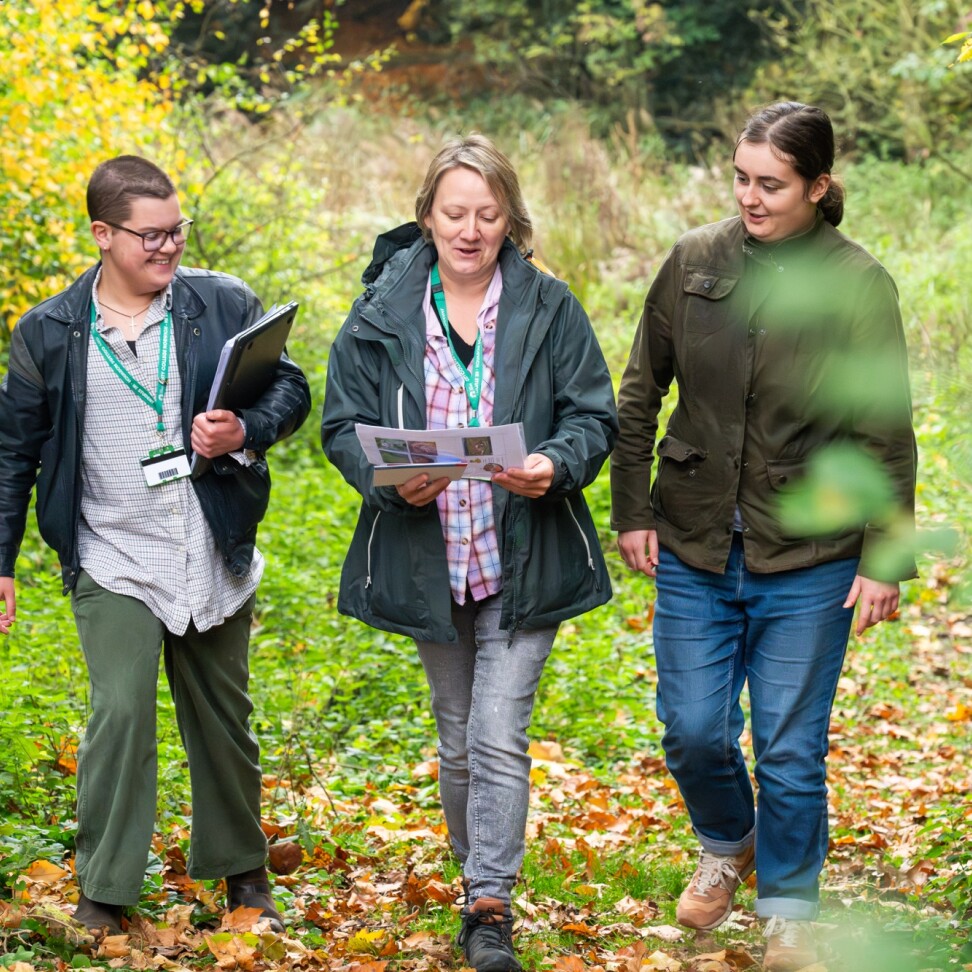BSc (Hons) Wildlife and Conservation

Are you passionate about nature, wildlife and the changing world? Our BSc (Hons) Wildlife and Conservation degree offers a comprehensive understanding of native and global animal and plant species, with opportunities to explore your individual interests through project-based research.Our range of science and practical modules will help you develop the skills needed for careers in Ecological Consultancy and Wildlife Conservation.
This programme is subject to validation / revalidation by UEA, ready to accept new entrants from September 2026. Therefore, for next year there may be some changes to this advertised course content following this process.
- Level
- 6
- Entry Point
- Sep 2026
- Duration
- Full Time, 3 years
- Venue
- Easton College campus
- UCAS Course Code
- C184
Reasons to study
this course
In the first year, the modules provide a strong grounding in biology, botany, and British wildlife identification. As you progress to the second and third year, you will delve into advanced topics such as ecology, habitat management, and conservation biology, while refining your research skills. Your studies will culminate in the completion of a dissertation in the final year, showcasing your expertise and academic growth.
You will also benefit from access to our designated county wildlife site at the Easton College campus. This invaluable resource provides hands-on opportunities to develop practical species identification and field research skills, bridging the gap between academic knowledge and real-world application.
Jerry Kinsley - Course Leader BSc (Hons) Wildlife and Conservation
Where will this
course take you?
Students will be well-equipped to progress into careers in the wildlife, conservation and ecological industries, or to progress onto postgraduate study in similar subjects at other institutions.
Student stories
Course structure
This course is full time, 3 years duration. The programme is delivered over 2 days per week - 30 teaching weeks per year.
Level 4 modules
British Wildlife and Identification Compulsory
British wildlife and their habitats have been shaped by hundreds of years of human intervention leading to a diversity of habitat types unusual for such a small land area. Site management requires a good knowledge of the range of appropriate management techniques available for each habitat as well as a sound base in ecological principles.
This module aims provides you with the skills and knowledge to identify a range of British wildlife and habitat types. This will include the recognition of dominant and characteristic vegetation as well as knowledge of significant plant and animal species found within each habitat. The ability to identify key species from a wide range of taxa is key to appreciating the biodiversity value of a range of habitats. You will develop an understanding of the abiotic and biotic relationships that determine the nature and diversity of each habitat. Adaptation of species to their given habitat will also be explored.
The module develops your understanding about the strategies for conserving species and habitats in the United Kingdom The anthropogenic impacts on UK wildlife will be considered and what mechanisms are in place to protect wildlife in this country from the impacts of farming, urban development, pollution and alien species. If the multifunctional nature of land in the British countryside is to be conserved, then a balance must be found between conflicting land users.
Assessment:
- Case study (50% of module weighting)
- Collection (50% of module weighting)
Introduction to Botany Compulsory
This module contains the basis of plant science and is an introduction to plant physiology and taxonomy, covering general botany including morphology and plant anatomy. The module will explore the ways in which plants acquire and process energy, nutrients, and water and how plants reproduce, grow, and develop. You will become familiar with botanical terminology and will enable them to learn the key diagnostic features of our commonest plant families.
Assessment:
-
Report (50% of module weighting)
-
Exam (50% of module weighting)
Practical Habitat Creation and Management Compulsory
In order to plan and project manage practical work in the land-based sector it is vital that the site manager understands the technical aspects of the proposed task(s). Site managers cannot ignore the importance of timescales, budgets and the management of materials, tools and labour.
This module will equip you with a range of practical skills appropriate to working in conservation management that will enable them to undertake specified construction, maintenance and habitat management tasks. These tasks will be focused upon the creation and management of semi-natural habitats.
The module aims to develop your practical confidence which will allow you to instruct and, where necessary, supervise staff and volunteers in undertaking practical tasks, as well as providing with the opportunity to develop specifications and design briefs as required when engaging with outside contractors.
The health and safety requirements of practical tasks are key components of the module. You must consider the implications of tool and livestock use and the need for risk assessment in project planning and implementation. You will undertake practical sessions at our designated college farm and county wildlife site at our Easton College campus.
Assessment:
-
Practical Portfolio (50% of module weighting)
-
Project Plan (50% of module weighting)
Principles of Biology Core
This module provides you with the essential background knowledge in cellular and molecular biology with an emphasis on genetics and evolution. You will become familiar with cellular structures and functions and the classification of living organisms.
The module aims to develop your knowledge and understanding of plant and animal physiology alongside with the homeostatic processes that are essential in ensuring the survival of the organism in constantly changing environments. The module introduces you to the mechanisms of heredity including cell division, sex determination and the laws of inheritance. You will also examine the processes which drive evolution, the concepts of natural selection and events which upset the population genetics including genetic drifts and founder effect.
This module aims to introduce you to, and develop, your observational and practical skills using light microscopy, breeding Drosphila melanogaster and using molecular techniques such as electrophoresis. These practical activities will improve your understanding and practical skills in biological science, the fundamental processes in living organisms and of contemporary scientific technologies.
Assessment:
-
Exam (60% of module weighting)
-
Academic Poster (40% of module weighting)
Principles of Environmental Science and Ecology Compulsory
Environmental systems underpin the ecology of life on Earth, providing the physical resources to maintain the flora and fauna that a growing human population relies on. Each natural system is intrinsically linked and balanced but the exploitation of these systems and their resources has led to increasing concerns for the future well-being of a growing global population and the Earth’s ecosystems.
Ecology is essential to our understanding of how to manage the land, its’ resources and biodiversity. Land use, policy and practice has often proved disastrous where there has been a lack of understanding of the way populations and ecosystems function at both large and small scales. This has resulted in declines in biodiversity and soil productivity.
This module aims to provide you with a broad understanding of the Earth’s natural system and an underpinning understanding of soil and water resources is essential to the sustainable management of the local, national and global environment. You will explore and examine geographical climate patterns and the impact that climate change is having on global populations, ecosystem services, and the policy decisions used in mitigation.
The module allows you to learn fundamental ecological theories in terms of the way that individuals, populations and species grow, interact and are distributed. The way in which energy is transferred through ecosystems and impacts on the length of food chains and numbers of individuals at varying trophic levels will be considered and it will further review the manner in which ecosystems alter with time and the influence of living organisms on successional processes.
You will also have the opportunity to build practical skills in assessing environmental systems and the analytical skills to discuss the complex issues that influence resource use. Furthermore, an understanding of these principles will be key to help graduates towards following a more sustainable path in the development of policies, management plans and personal choice.
Assessment:
-
Essay (50% of module weighting)
-
Examination (50% of module weighting)
Professional and Academic Skills Compulsory
Level 5 module
Behavioural Ecology Compulsory
This module will explore the inter-relationships between behaviour, ecology and evolution of animals and plants. You will learn why organisms behave the way they do under particular ecological conditions and how they respond and adapt to changes in their environment. The principal models and theories in relation to behaviour and behavioural ecology will be examined, using case studies and examples to illustrate.
You will seek to explain the evolution of specific behavioural patterns and have the opportunity to undertake some original research in behavioural ecology on a selected species. This will involve experimental design, research, interpretation, analysis, and presentation of results. Through understanding key concepts of behavioural ecology you will be able to make more informed choices with regards to conservation within other subject areas such as habitat management and countryside recreation.
Assessment:
-
Examination (50% of module weighting)
-
Experimental Project Report (50% of module weighting)
Field Ecology Compulsory
This module will familiarise you with a range of survey techniques for use in the field and will build on the identification skills acquired in British Wildlife and Identification.
Surveys undertaken will encompass habitat and species surveys of the key groups and all surveys will be evaluated and analysed. Standard monitoring programmes used within the conservation industry will be evaluated. You will devise and undertake a field ecology investigation of their choice and will analyse the data from this investigation and present your finding to your peer group.
Assessment:
-
Portfolio (100% of weighting)
Global Biodiversity Compulsory
The case study enables you to select a global biodiversity hotspot and investigate how it meets the criteria of a biodiversity hotspot, the threats to the hotspot and how well the hotspot is being conserved.
The exam will comprise of two essay questions chosen from a list of five.
Formative Assessment - Formative assessments will include a mock exam and an informal presentation given by you on your Biodiversity Hotspot.
Assessment:
-
Case Study (50% of module weighting)
-
Examination (50% of module weighting)
Introduction to QGIS Compulsory
This module will provide you with valuable practical skills and the knowledge of Geographical Information Systems through the understanding of the concepts and training during practical sessions (two third of the face-to-face teaching time). Students will discover, using relevant case studies, how to use Open-Source software (QGIS). You will also explore a variety of resources for spatial data at both local and global scales including species distribution, protected areas, habitats maps, satellite images, etc. You will learn how to collect spatial data in the field using GPS and tracking devices, how to manage and insert these data into QGIS, how to explore and analyse the data and how to create high quality cartographic and non-cartographic outputs. The practical sessions will cover a variety of techniques on how to use, analyse and represent available spatial data relevant to the study of terrestrial and marine organisms in the context of ecological and behavioural studies and wildlife conservation.
The theory of QGIS and its uses in biology are assessed through a short essay assessment. The practical skills are assessed through a scientific report demonstrating the use of QGIS to answer a biologically relevant question. Students can either use a dataset provided by the lecturer or are free to use any available spatial dataset. Assessment focuses on the correct use of the QGIS tools and methods and the quality of the cartographic output. This module provides strong links to employment, as the knowledge of QGIS and the use of these techniques are valuable practical skills in industry.
Assessment:
-
Essay (30% of module weighting)
-
Scientific Report (70% of module weighting)
Management Planning for Habitats Compulsory
Without management planning many important habitats and their species may be lost and the diversity of the British landscape eroded. This module aims to allow learners the opportunity to focus on the conservation management of one selected site of conservation interest that is relevant to the local area or of particular interest to the individual. The conservation of habitats, and the species that they contain, is the central pillar of the management of biodiversity. This module examines the approaches to achieving the sustainable management of a site with specific habitats and associated species. Its aim is to equip learners with the ability to apply conservation approaches to the site’s management. Where appropriate, strategies for the reintroduction of key species will also be discussed.
The module enables you to discuss the factors that affect the conservation value of habitats and to evaluate their impact. In order to equip learners with management planning skills, practical survey and monitoring techniques will be employed in this module. These are the key tools that facilitate scientific and evidence-based planning to ensure that conservation objectives are met in the long term of management of sites. This module assists you to assess the strategic mechanisms available to influence these factors, and to propose appropriate mitigation and remedial activity. By the completion of this module, you will be able to formulate appropriate plans to conduct management activity on selected habitats.
Assessment:
-
Survey Report (50% of module weighting)
-
Management Plan (50% of module weighting)
Research Skills Core
This module is designed to enable participants to further develop the learning and development skills introduced in the Higher Learning Skills module in year 1 (or its equivalent). It provides the opportunity for you to focus on practice-based research and evaluation skills.
The module will develop an appreciation of qualitative and quantitative methodology, research methods and critical thinking skills appropriate to the subject area. This will provide a foundation for research at Level 6.
Assessment:
-
Open book, time-constrained assignment (70% of module weighting)
-
Research Proposal (30% of module weighting)
Level 6 modules
Conservation Biology Compulsory
Conservation Biology is the scientific study of biodiversity with the aim of protecting species, habitats and ecosystems. In this module you will review biodiversity and its importance. Threats to biodiversity will be critically analysed within the context of sustainability. Global climate change is a significant factor affecting the distribution of the flora and fauna of planet Earth. Maintaining biodiversity with a growing human population must be a priority. Recent research suggests that the Earth is experiencing its sixth mass extinction event in its history and much of this is attributed to habitat degradation arising from human development and overexploitation of the Earth’s resources. Some species are more vulnerable to extinction than others. In this module you will review the drivers of extinction utilising the IUCN Red List and other conservation assessment tools to assess the conservation status of individual species and to identify which species to save. The ethics of saving only charismatic species, umbrella species and flagship species versus saving other species will be examined.
There are a range of conservation management strategies, and some are more successful than others. You will appraise the features of effective conservation programmes and identify reasons for failures of others. Methods for measuring outcomes in conservation will be critically analysed. Animal welfare is a significant factor in saving species from extinction. You will explore which aspects of animal welfare are fundamental to the success of captive breeding programmes. Comparing and contrasting issues and case-study examples from in-situ and ex-situ breeding programmes will enable you to justify the most effective approaches for breeding animals in captivity for conservation. The vital roles of population structure and genetic diversity will be evaluated alongside welfare aspects within the context of releasing animals from captive breeding programmes into the wild to create sustainable wild populations. Field study excursions to a range of collections will support research into welfare and population management. Through understanding the processes involved in breeding and managing captive species, you will be encouraged to question traditional and modern techniques in conservation. The core of the module will be delivered by Easton campus staff together with significant input from practicing researchers and practitioners in conservation. Guest speakers from ancillary businesses, conservation projects and charities will also be involved.
There may be the additional opportunity, subject to interest and current travel parameters, to undertake a residential field trip to the Durrell Institute in Jersey, a world-renowned conservation and research facility, to support the study of this module and provide appropriate content towards assessments. This trip would provide hands on experience coupled with lectures delivered by the institutes qualified staff members. The cost of this trip would be in addition to course fees and would need to be met by the student in full by a specified date to ensure a guaranteed place on the trip. Specific costings for a student place will be calculated each year and are subject to change.
Assessment:
-
Field Study Report (50% of module weighting)
-
Essay (50% of module weighting)
Dissertation Core
This module allows you to work on an academic research project of their own choosing, utilising evidenced based methodologies and using appropriate research tools. This research project could be completed in conjunction with local businesses/charities, as well as either student utilising existing data, collecting their own data or undertaking an evaluative project. Each student will be allocated a supervisor who will advise on choice of topic and on the progress of the work. You will be encouraged to use the research project as a summative exercise. Through which to evaluate their own academic progress during the degree programme. The dissertation may take the form of either a discursive, structure and evaluative thesis or a data-based project. Learners completing a project will be given an opportunity to envisage, design, and implement a piece of research that will entail collecting, analysing, and interpreting. original data in the light of extant knowledge. It will also provide them with practical skills in participant recruitment, research ethics and design, project management, data analysis, and communication that will galvanise their employability profile.
Assessment:
- Report (90% of module weighting)
- Presentation (10% of module weighting)
Ecological Techniques for Industry Compulsory
The monitoring and evaluation of flora and fauna remains a key element of ecological practice. Techniques and technology for undertaking work in the field are constantly under development and to remain industry competent, practitioners need to stay up to date. This may be regarding recent developments in monitoring, the use of computerised applications, use of mechanical resources whilst also maintaining a sound knowledge and understanding of taxonomy.
The module aims to allow you to hone your skills in the wide field of ecology from the perspective of identifying the species of animals and plants present on selected sites of interest within East Anglia. You will focus more specifically on the most appropriate method of surveying and monitoring species on these sites and discuss how effective report writing and imaginative planning might mitigate land-use changes.
College staff will deliver the core of the module with significant input from ecological consultants and practitioners in conservation organisations providing a real-life link to industry and application of theory.
Assessment:
-
Exam (30% of module weighting)
-
Report (70% of module weighting)
Environmental Education Compulsory
Recent research has shown that the UK population is becoming increasingly disconnected from nature. The Covid 19 pandemic has highlighted that humans need nature for both physical and mental wellbeing. Our planet Earth depends upon its citizens to understand and protect valuable habitats for nature. Outdoor experiences are a great opportunity for people to connect with nature, to raise environmental awareness and promote pro-environmental behaviours in society. Consequently, a vital aspect of working in nature conservation is the ability to communicate conservation ideas effectively to a range of audiences, supported with effective interpretative media.
This module seeks to provide youwith coherent understanding of the theories, methods and the necessary professional skills for providing outdoor learning activities and interpretative media resources that will support multiple roles in the nature conservation sector. Environmental activities suitable for implementation in nature reserves, schools, colleges and the wider community will be linked to interpretation theories, methods and techniques to provide a wide range of strategies for use in countryside management.
The historical aspects of environmental education will be explored within both local and global contexts and be related to environmental good practice and sustainability. The module will develop the student’s ability to evaluate the impact of outdoor activities on wildlife, within the context of nature conservation and ways to educate to mitigate. Effective development of interpretative media designed to engage visitors will be appraised at selected sites along with opportunities for outdoor learning. The impact of such outdoor experiences on environmental behaviours will be reviewed.
You will be encouraged to communicate environmental information using a range of practical and theoretical approaches. Organisational skills, teaching methods and the implementation of safe working strategies will develop leadership and teamwork skills for successfully creating a range of learning activities and resources. You will design, develop, deliver and evaluate outdoor learning activities and resources as part of their assessment in this module.
Assessment:
-
Site Report (50% of module weighting)
-
Portfolio of Outdoor Learning Activities (50% of module weighting)
Science Communication for Conservationists Compulsory
This module aims to give you an understanding of how modern science is disseminated to the public via a range of science communicators and how science is communicated to governments, politicians, and policy makers. You will examine strong and poor strategies for communicating science to various audiences and how science information and misinformation can be used to change public perception. You will examine the role of written press, TV, radio, websites, blogs, etc. and using case studies, will look at the approach of the press and the impact on the public and government policy. Examples utilised will be current within the industry and research fields, which may include topics such as climate change, land management, biodiversity loss, rewilding, and invasive species.
You will use reflections on these strategies to create select forms of media to engage a range of audiences. This module aims to provide you with a series of multidisciplinary skills for use in industry and academia. Continuous technological advancements mean that animal scientist roles can range from field work to marketing and liaising with the public or government officials.
By providing you with the opportunity to analyse communication strategies and create their own targeted media, they will be appropriately skilled to meet the demands of future employers.
Assessment:
-
Presentation (50% of module weighting)
-
Multimedia and Reflection (50% of module weighting)
Course details
Assessment methods
You will be assessed through a broad range of strategies designed to evaluate both practical and theoretical skills. These include academic posters, essays, literature reviews, and project work such as proposals, plans, presentations, and reports. Assessments also encompass oral presentations, reflective journals, practical evaluations, examinations, laboratory reports, and the creation of management plans, ensuring a comprehensive approach to measuring student learning and achievement.
Awarded by
This course is awarded by the University of East Anglia and regulated by The Office for Students.


Entry requirements
UCAS points
Our typical offer is 80 UCAS tariff points from A Levels or equivalent
GCSEs
A minimum of GCSE maths, English and science (preferred) grade 4/C or above
Scottish Highers
UCAS points from Scottish Highers or Advanced Levels are accepted
BTEC
UCAS tariff points from BTEC or City and Guilds diplomas are accepted
Open University
Open University credits in lieu of A Levels are accepted
Access to HE Diplomas
Access to Higher Education Diplomas at Pass level with suitable science content are accepted
Contextualised Offer
You may also be eligible for a contextualised offer for this programme, please see our Contextualised Offer page for further details and to check your eligibility.
Applicants over 21 years of age, who do not have relevant UCAS points, will be reviewed on a case-by-case basis but should demonstrate evidence of an appropriate qualification, experience in the field or a strong interest.
Applications from students whose first language is not English are welcome. For International students we require evidence of proficiency in - English (including writing, speaking, listening and reading); the required minimum is IELTS Academic (SELT) 6.0 overall (minimum 5.5 in all components). Please contact the Admissions Team for advice and guidance.
Course fees
£9,535 per year for UK students.
£15,052 per year for international students (students from outside of the UK).
Other course costs
It would be good to invest in a warm waterproof coat, wellie boots, waterproof trousers and sturdy walking boots. You may also find it useful to have binoculars. There may also be trips that require a contribution.
We were awarded a TEF Silver rating overall in 2023, achieving this for both student experience and student outcomes.

Search courses
Search CCN HE





